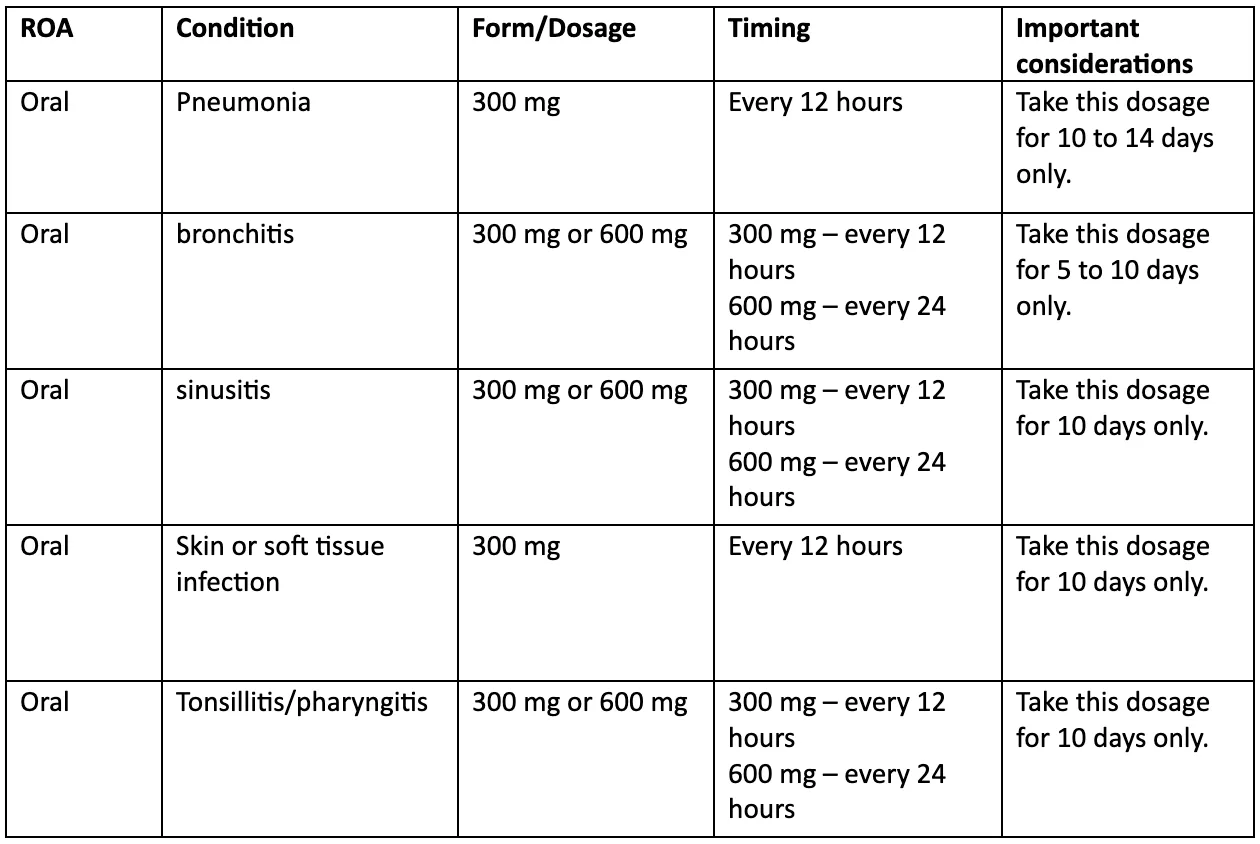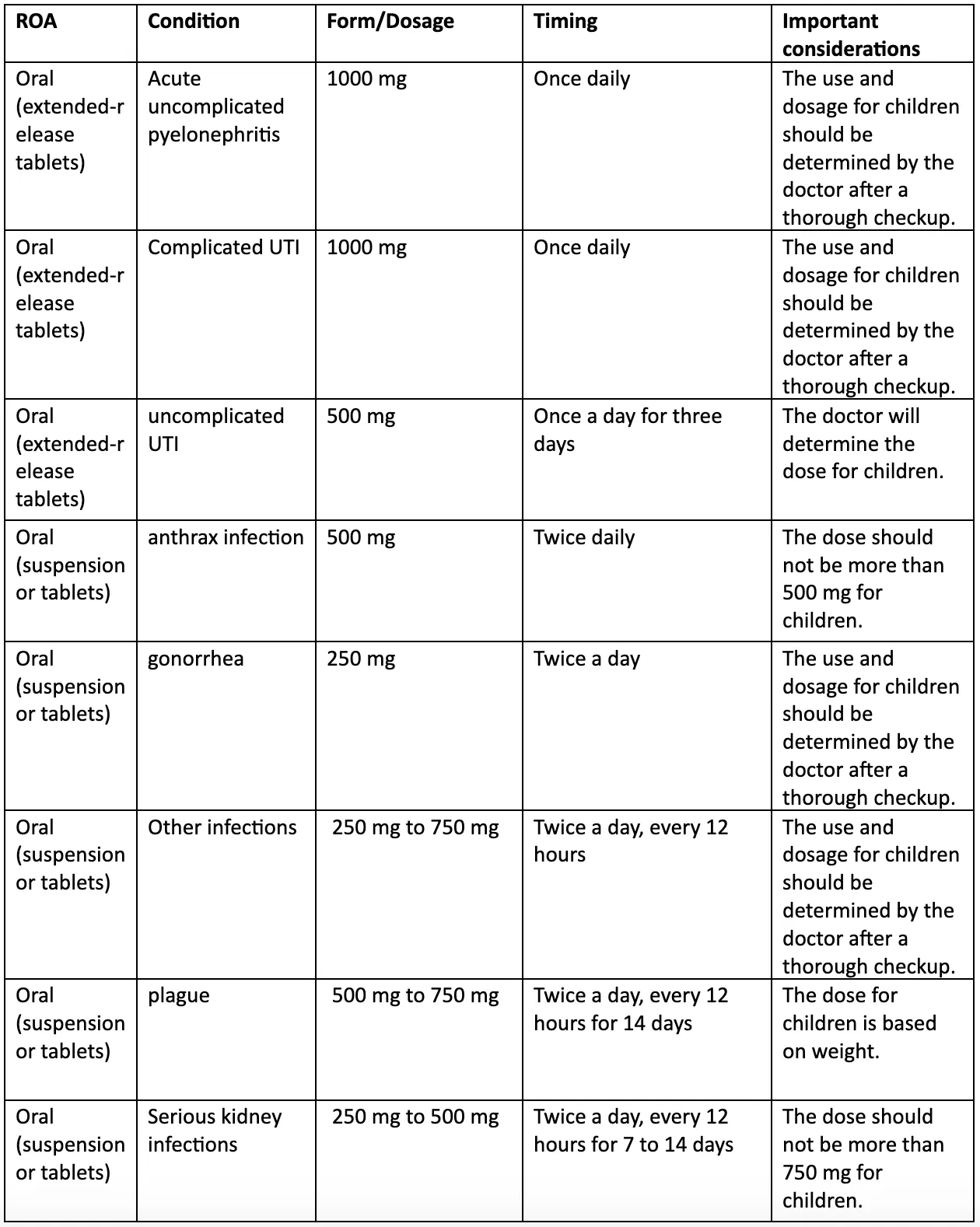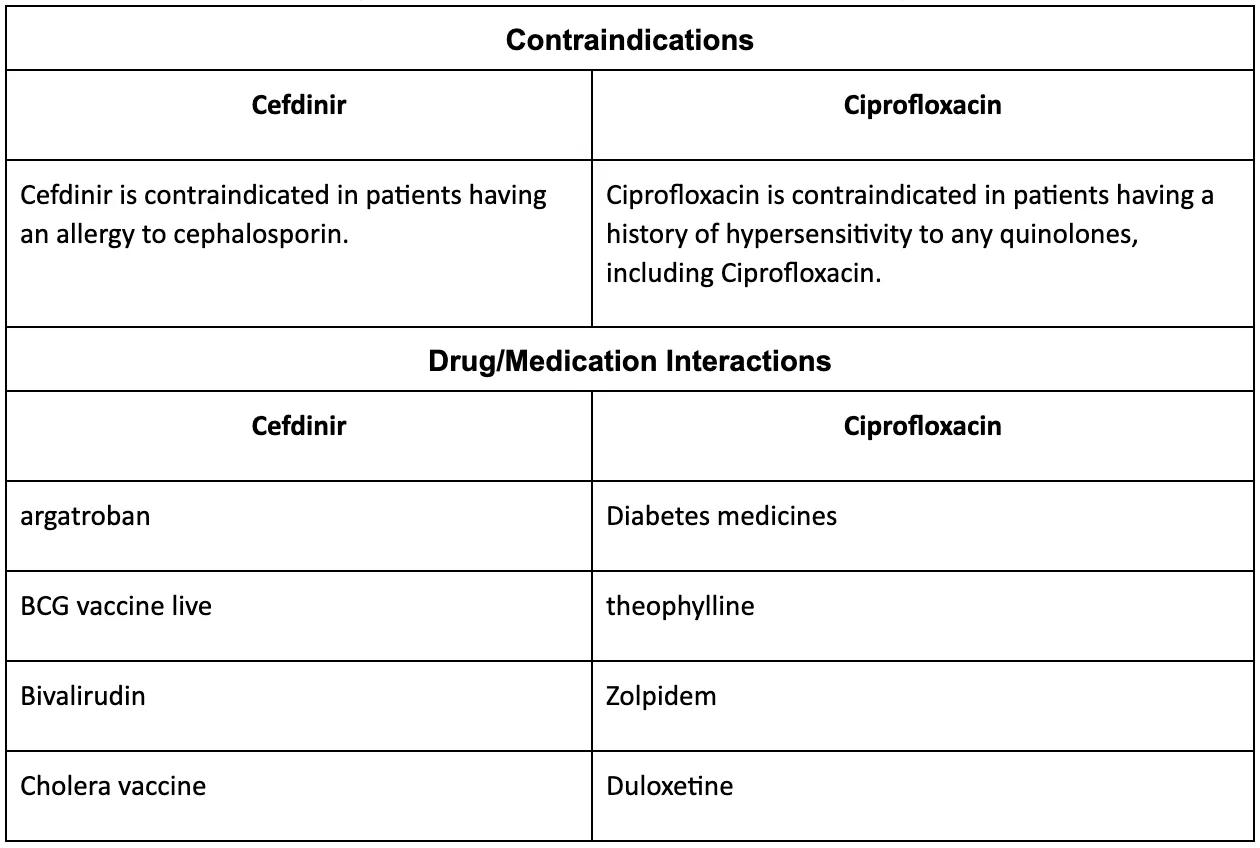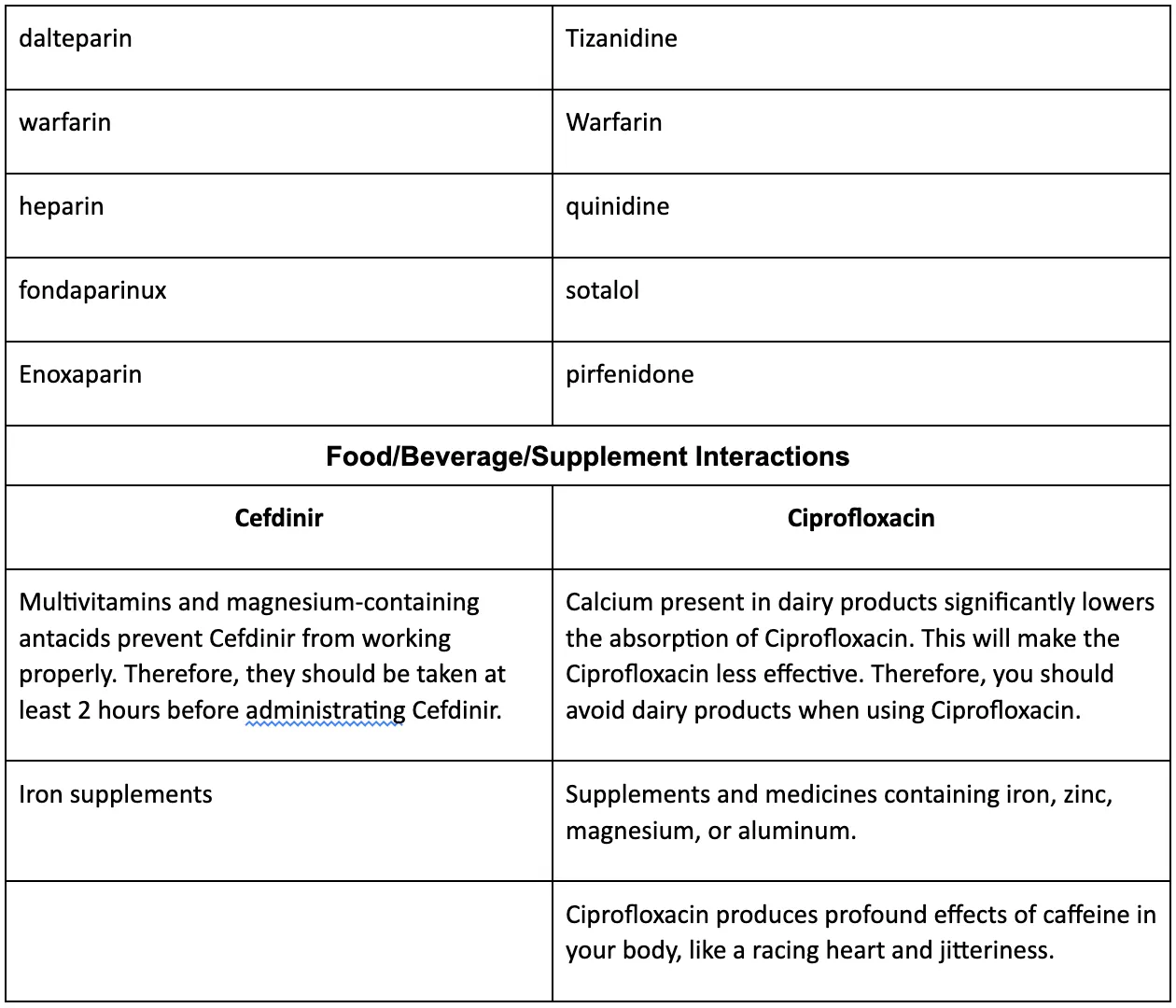Cefdinir vs Ciprofloxacin
Introduction
When it comes to treating bacterial infections, Cefdinir and Ciprofloxacin are quite popular. They both are effective antibiotics that can be used to treat a wide range of infections caused by bacteria.
Cefdinir is a cephalosporin that is typically prescribed for skin and respiratory infections. Ciprofloxacin, on the other hand, is a broad-spectrum fluoroquinolone antibiotic that is approved by the Food and Drug Administration to treat sexually transmitted diseases (STIs), Urinary Tract Infections (UTIs), and gastrointestinal infections.
These medicines are available in tablets, capsules, and suspension forms. These medicines are recommended depending on the type of infection and various other factors. Therefore, a doctor's recommendation is necessary before using any of these for a bacterial infection.
About Cefdinir and Ciprofloxacin
What is Cefdinir?
Cefdinir is a Cephalosporin antibiotic that was commonly available in the market with the brand name Omnicef, but it has been discontinued. Cephalosporin work by slowing down the growth of bacteria, which is responsible for the existing infection. It can be used to treat a variety of bacterial infections like UTIs, skin infections, pneumonia caused by bacteria, sinus infections, and skin infections.
Cefdinir is an oral antibiotic available in suspension and capsules. They are meant to be taken once or twice daily, depending upon the type of infection. The patient should complete the full treatment course in order to get rid of the infection completely.
What conditions is Cefdinir approved to treat?
Cefdinir was approved by the US Food and Drug Administration in 1997. Cefdinir is a highly effective drug that is prescribed for a wide range of bacterial infections, the major ones being bronchitis and skin infection.
Here is a list of conditions Cefdinir help with:
- Pneumonia
- Skin infections
- Strep throat
- Ear infection
- Sinus infection
- Tonsils infection
- Lung infections
- Pediatric fever
- Bacterial urinary tract infection
How does Cefdinir work for Bacterial Infections?
The cell wall is the outermost part of the cell that encloses all the cellular organelles and other parts. Cefdinir prevents the cell wall synthesis of infectious bacteria, thereby preventing their growth.
Cefdinir reaches the bacteria and binds to the penicillin-binding proteins (PBPs) that are located on the surface of bacterial cells. These proteins are necessary for cell wall synthesis, which maintains the integrity and survival of bacteria.
As Cefdinir binds to PBPs, it interferes with the final step of transpeptidation in cell walls. This reaction basically cross-links the peptidoglycan chains of the cell wall. As this link is weakened by the Cefdinir, the cell wall ruptures, resulting in the lysis of bacteria and, ultimately, its death.
Cefdinir works specifically against bacteria and slows down their growth. It does not affect the replication of any other organisms like viruses.
What is Ciprofloxacin?
Ciprofloxacin belongs to the class of drugs known as quinolone antibiotics. It is effective against a wide range of bacterial infections. The growth of both gram-negative and gram-positive bacteria can be stopped with the help of Ciprofloxacin. The primary infections that Ciprofloxacin treats include respiratory tract infections, urinary tract infections, skin and soft tissues infection, and some sexually transmitted diseases.
The dosage and length of treatment vary considerably depending on the type of infection needed to treat. Like any other medication, Ciprofloxacin also has several side effects.
What conditions is Ciprofloxacin approved to treat?
This broad-spectrum antibiotic was approved by the FDA in 1994. It can help with a number of bacterial infections occurring in different body parts. Ciprofloxacin majorly helps with the following conditions:
- Eye infections
- Ear infections
- Chest infections such as pneumonia
- Bone and joint infections
- Conjunctivitis
- Sexually transmitted diseases
- Gastrointestinal infections
- Urinary tract infections
- Respiratory tract infections
How does Ciprofloxacin work for Bacterial Infections?
Ciprofloxacin inhibits the synthesis of bacterial DNA. This drug is effective against both gram-negative and gram-positive bacteria and belongs to a second-generation fluoroquinolone. The major action of this drug is on DNA gyrase and topoisomerase IV enzymes. Ciprofloxacin inhibits these enzymes as they are involved in the transcription, replication, and repair of DNA.
DNA gyrase is found specifically in bacteria that are involved in chain elongation during the synthesis of DNA. Ciprofloxacin binds to this enzyme, thereby inhibiting its activity. This overall leads to DNA damage, which causes cell death.
DNA gyrase is found in bacterial cells only, it is not present in mammalian cells. Therefore, Ciprofloxacin is effective as it targets DNA gyrase, leaving the human DNA unaffected.
Effectiveness
How effective are Cefdinir and Ciprofloxacin for treating Bacterial Infections?
Cefdinir is quite an effective drug that gives the patient relief after 2 to 4 hours of administration. It typically helps the person in recovering from the disease within 2 days. However, completing a full course is necessary to get rid of the infection entirely, which may take up to 14 days.
Ciprofloxacin, on the other hand, relieves the patient after an hour. However, no improvement in symptoms is observed until two to three days. This medicine takes at least a week to show improvements in the symptoms of some infections.
Dosage information
How is Cefdinir administered for Bacterial Infections?
Cefdinir is administered orally. It is available in the following two forms:
- Capsules
- Oral suspension
Cefdinir dosage information

How is Ciprofloxacin administered for Bacterial Infections?
This drug can be administered through different routes, depending on the infection needed to treat. It is available in the following forms:
- Intravenous infusion
- Oral tablets
- Oral suspension
Ciprofloxacin dosage information

Side Effects
What are the most common side effects of Cefdinir?
Though Cefdinir is very beneficial against bacterial infection, it has a number of side effects that users commonly experience. The most commons ones are:
- Diarrhea
- Sore throat
- Fever
- Cough
- Nausea
- Vomiting
- Stomach pain
- Vaginal discharge and itching
Are there any potential serious side effects of Cefdinir?
You may experience some serious side effects when dosing Cefdinir. Here is what you may go through:
- Pale skin
- Unusual bleeding
- Vaginal yeast infection
- Severe allergic reactions
- Liver toxicity
- Aplastic or hemolytic anemia
- Dermatitis
Seek medical help immediately if you face any of these side effects.
What are the most common side effects of Ciprofloxacin?
Here are some common side effects that you may experience when dosing on Ciprofloxacin:
- Nausea
- Diarrhea
- Low blood sugar levels
- Changes in mood and behavior
- Redness in the eye
- White specks on the eye surface
- Bad taste in the mouth
- Heartburn
- Pale skin
- Sleeplessness
Are there any potential serious side effects of Ciprofloxacin?
You may experience the following serious side effects with Ciprofloxacin:
- Muscle weakness
- Extreme tiredness
- Pain sensations
- Fatigue
- Tinnitus
- Irregular heartbeat
- Swollen feet, stomach, and ankles
- Breathlessness
Rush to get medical help immediately if you experience any of these side effects.
Contraindications and interactions
Warnings and general precautions for Cefdinir and Ciprofloxacin
Medical drugs can react with a number of medications and supplements that will make the situation worse. Therefore, you should let your doctor know about your previous history of medicines you have taken or any medical disorder you have.
These medicines have some side effects, out of which diarrhea and allergy are the most common. You should let your doctor know if the situation persists.
These medicines can be taken with food. In case you are using the liquid suspension of these drugs, it is necessary to shake them well before use.
At last, complete the treatment course as prescribed by the doctor, even if you feel completely recovered. The symptoms disappear, but the infection might not have been cleared.
Contraindications and important interactions for Cefdinir and Ciprofloxacin


Cost Comparison
How much do Cefdinir and Ciprofloxacin cost?
The prices of these drugs vary considerably depending on the brand, the pharmacy you purchase from, and the location.
The approximate price for Cefdinir is given below:
- 300 mg Cefdinir costs $23.50 for 14 capsules
- 125 mg/5 mL oral powder for reconstitution costs $25.52 for 60 ml
- 250 mg/5 mL oral powder for reconstitution costs $34.86 for 60 ml
- Given below is the price for Ciprofloxacin tablets and oral powder
- 250 mg Ciprofloxacin costs $525.57 for 100 tablets
- 500 mg Ciprofloxacin costs $613.54 for 100 tablets
- 250 mg/5 mL oral powder for reconstitution costs $146.81 for 100 ml
- 500 mg/5 mL oral powder for reconstitution costs $169.89 for 100 ml
Popularity of Cefdinir and Ciprofloxacin
Cefdinir and Ciprofloxacin are both antibiotics that are effective against a wide range of bacterial infections. Ciprofloxacin is considered a strong antibiotic and is one of the most commonly used antibiotics, with over three million users in the US as of 2020. Cefdinir, on the other hand, is also effective against bacterial infection occurring in different body parts. However, only 1.7 million users of Cefdinir have been reported in the US in 2020.
Though they are both prescribed for almost similar kinds of bacterial infections, the popularity of Ciprofloxacin is higher among the masses.
These statistics can help individuals pick the antibiotic needed for a certain bacterial infection. However, a doctor's recommendation should be given priority.
Conclusion
Takeaway
Cefdinir and Ciprofloxacin are both highly effective antibacterial medicines that slow down or inhibit the growth of bacteria and thus help the patient recover from bacterial infection. Cefdinir is a cephalosporin, while Ciprofloxacin is a fluoroquinolone.
Both these drugs help with UTIs, STDs, gastrointestinal tract infections, and a number of other infections. However, the choice between these drugs depends upon a number of factors, including individual patient susceptibility and type of infection.